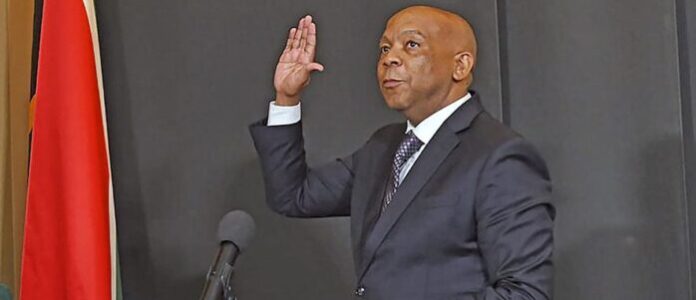The seventh administration has seen both newly appointed ministers and those retained, taking over their positions commendable energy.
Parliament also moved to elect and appoint committee chairpersons, some of whom started their work in earnest. With the Public Service and Administration committee sitting to adopt tabled reports from the Public Service Commission and the Department of Public Service and Administration on Wednesday.
Among the two retentions in President Cyril Ramaphosa’s cabinet, are those who have been central to the stablising of the power grid. These are Minister in the Presidency, Khumbudzo Ntshavheni, and Electricity and Energy Minister, Kgosientsho Ramokgopa.
Ramaphosa appointed Ramokgopa as the Minister in the Presidency responsible for electricity last year. Amid widespread skepticism due to the crippling power cuts that dogged the country over several years.
Work on tackling corruption at Eskom ensued
The cancerous corruption and collusion of officials and contractors at Eskom was fingered. It has been singled out as the major cause of the ongoing breakdowns at power stations. Cartels servicing the national power producer in different sectors are known to have struck terror in the hearts of power station managers. Right down to individual buyers responsible for the procurement of goods and services.
Ramokgopa has clearly proved to be effective in his endeavors to stabilise Eskom. This following uninterrupted power supply for almost four months. The period includes some of the coldest days to date this winter, hence being rewarded with a full ministry.
When Ramaphosa appointed Ntshavheni as the Minister responsible for the State Security Agency (SSA), there was tension. It had emerged that Eskom had been infiltrated by unsanctioned operatives. They not only bypassed vetting processes, but were given unfettered access to the national power producer’s systems and employees for scrutiny.
Dodgy R500m contract
It was almost a year ago when a fat, juicy, three month R500-million emergency security contract was awarded. It was handed without contest to Fidelity Services Group by Eskom. This happened on the back of a risk assessment compiled by the power utility’s suspended head of security, Karen Pillay.
It came to light that Pillay’s assessment was based on the report compiled by ex-CEO De Ruyter’s sponsored spies. Amongst others, it stated that there was imminent sabotage and unrests that were planned at several power stations.
Ntshavheni played a pivotal role in creating the space for Ramokgopa to be effective in fixing Eskom. She did this together with her counterparts at the National Joint Operational and Intelligence Structure. These coordinate all security and law enforcement operations throughout the country. They did this trough their efforts in pushing for prosecutions on pending cases. And also effecting arrests where officials are alleged to have been involved in acts of wrongdoing.
Incomplete probe on the said contract overshadows progress made
However, despite this progress, an elephant in the room looms large.
Eskom has failed to finalise an investigation into the Fidelity contract. This is despite being instructed to do so in August last year. The instruction was by the former chairperson of Parliament’s Standing Committee on Public Accounts (Scopa), Mkhuleko Hlengwa.
Eskom suspended Pillay for her alleged role in the Fidelity contract and instituted an internal process. Newly appointed Group CEO, Dan Marokane, admitted that it was unacceptable that the it has taken a whole year to investigate the contract. The said contract was was primarily handled by four people. These are Pillay, De Ruyter, Eskom CFO Calib Cassim and former COO, Jan Oberholzer.
Probe needs to be finalised, for the good of the power utility’s clean-up
It has since emerged that the relationship between Pillay and Eskom has reached a point of no return. This as the suspended head of security has reached out to the CCMA, seeking a settlement from Eskom. Right in the middle of the probe. Notably, Pillay has been on full pay for the duration of her suspension. Something that the newly appointed Scopa should immediately deal with as a matter of priority.
It is imperative that Ntshavheni and Ramokgopa pressure Eskom on finalising its investigation into the Fidelity contract. It is likely to be found to have been awarded unlawfully.
Furthermore, the investigation will bring closure to those affected by the ongoing probes. It will also bring a much-needed stability at Eskom. While restoration is being pursued by the current executive at the power utility.



